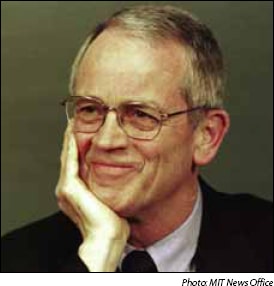Chuck Vest, RIP
Chuck Vest had the uncanny ability to make me feel smarter than I am. Although he undoubtedly knew more and had thought more deeply about any topic that I discussed with him, he always listened as if he were the acolyte and not the sage. He asked such perceptive questions and suggested such insightful implications that I would be convinced, at least for the moment, that I had released a flood of wisdom. My inchoate hunches, sloppy analogies, and gaps in logic would somehow be transformed into a coherent and compelling analysis. He would thank me for helping him understand the topic more clearly, and for the next day or two I would confidently spout opinions under the delusion that I was Chuck Vest’s policy guru.
Eventually my colleague’s blank stares and rolled eyes would bring me back to reality, and I had to admit that it wasn’t that they weren’t savvy enough to value my finely honed mind. Before long I would start hungering for another Chuck Vest fix. Even a brief interchange at the salad bar or in the elevator would get me high for a while. I would go to meetings where he was speaking hoping that he would say something that with sufficient effort I could trace back though six degrees of permutation to something I had said to him.
I am sure that I am not alone in this experience. And it’s not just us lowly Walter Mittys. A long line of presidents, cabinet secretaries, congressional committee chairs, and corporate CEOs lined up to have Chuck on their blue ribbon advisory panels. At some point I learned to look for Chuck’s name on the committee roster before deciding whether a report was worth reading.
Those of us who toil behind the scenes on National Research Council studies are not immune from twinges of spotlight envy. “I mean, I wrote the goddam report, why am I not the one appearing on the News Hour. I know this report better than any of the committee members and could explain it more cogently.” Unless Chuck was on the committee. Then we would willingly step aside, because without departing from the shared consensus, Chuck would transmute our pedestrian insights and turgid prose into eloquent gems of precision.
Well, Chuck is gone, and his absence will be felt from the lowliest policy dweeb to the U.S. president. We’ll be forced to untangle our own random thoughts, craft our own pithy summations, and earn the respect that Chuck granted us so generously. We can only hope to achieve half the clarity that he mastered and to convey it with half the grace and humility that he displayed.

